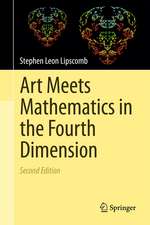Factorization Algebras in Quantum Field Theory: Volume 1: New Mathematical Monographs, cartea 31
Autor Kevin Costello, Owen Gwilliamen Limba Engleză Hardback – 14 dec 2016
Din seria New Mathematical Monographs
- 14%
 Preț: 954.57 lei
Preț: 954.57 lei - 14%
 Preț: 1469.84 lei
Preț: 1469.84 lei - 14%
 Preț: 871.20 lei
Preț: 871.20 lei - 14%
 Preț: 1435.42 lei
Preț: 1435.42 lei - 9%
 Preț: 1174.66 lei
Preț: 1174.66 lei - 14%
 Preț: 1001.91 lei
Preț: 1001.91 lei - 9%
 Preț: 1011.28 lei
Preț: 1011.28 lei - 14%
 Preț: 1005.89 lei
Preț: 1005.89 lei - 11%
 Preț: 555.59 lei
Preț: 555.59 lei - 14%
 Preț: 1004.72 lei
Preț: 1004.72 lei - 14%
 Preț: 1144.20 lei
Preț: 1144.20 lei - 14%
 Preț: 895.68 lei
Preț: 895.68 lei - 14%
 Preț: 891.56 lei
Preț: 891.56 lei - 11%
 Preț: 515.12 lei
Preț: 515.12 lei - 11%
 Preț: 650.83 lei
Preț: 650.83 lei - 11%
 Preț: 635.75 lei
Preț: 635.75 lei - 11%
 Preț: 483.30 lei
Preț: 483.30 lei - 14%
 Preț: 1207.73 lei
Preț: 1207.73 lei - 14%
 Preț: 1150.49 lei
Preț: 1150.49 lei - 14%
 Preț: 724.71 lei
Preț: 724.71 lei - 14%
 Preț: 789.51 lei
Preț: 789.51 lei - 11%
 Preț: 631.51 lei
Preț: 631.51 lei - 14%
 Preț: 807.92 lei
Preț: 807.92 lei - 14%
 Preț: 897.68 lei
Preț: 897.68 lei - 14%
 Preț: 896.20 lei
Preț: 896.20 lei - 14%
 Preț: 1006.70 lei
Preț: 1006.70 lei - 14%
 Preț: 1145.05 lei
Preț: 1145.05 lei - 14%
 Preț: 1003.55 lei
Preț: 1003.55 lei - 14%
 Preț: 1007.02 lei
Preț: 1007.02 lei - 14%
 Preț: 1030.04 lei
Preț: 1030.04 lei - 14%
 Preț: 1249.14 lei
Preț: 1249.14 lei - 14%
 Preț: 1148.00 lei
Preț: 1148.00 lei - 14%
 Preț: 1210.98 lei
Preț: 1210.98 lei - 14%
 Preț: 1149.82 lei
Preț: 1149.82 lei - 11%
 Preț: 519.28 lei
Preț: 519.28 lei - 14%
 Preț: 1006.38 lei
Preț: 1006.38 lei - 14%
 Preț: 896.01 lei
Preț: 896.01 lei - 14%
 Preț: 1010.19 lei
Preț: 1010.19 lei - 14%
 Preț: 874.34 lei
Preț: 874.34 lei - 8%
 Preț: 532.52 lei
Preț: 532.52 lei - 14%
 Preț: 1011.00 lei
Preț: 1011.00 lei - 14%
 Preț: 892.21 lei
Preț: 892.21 lei - 14%
 Preț: 791.46 lei
Preț: 791.46 lei - 14%
 Preț: 786.00 lei
Preț: 786.00 lei - 27%
 Preț: 1030.23 lei
Preț: 1030.23 lei - 19%
 Preț: 579.34 lei
Preț: 579.34 lei
Preț: 1019.07 lei
Preț vechi: 1184.97 lei
-14% Nou
Puncte Express: 1529
Preț estimativ în valută:
195.05€ • 202.86$ • 163.45£
195.05€ • 202.86$ • 163.45£
Carte tipărită la comandă
Livrare economică 13-27 martie
Preluare comenzi: 021 569.72.76
Specificații
ISBN-13: 9781107163102
ISBN-10: 1107163102
Pagini: 398
Dimensiuni: 152 x 229 x 25 mm
Greutate: 0.75 kg
Editura: Cambridge University Press
Colecția Cambridge University Press
Seria New Mathematical Monographs
Locul publicării:New York, United States
ISBN-10: 1107163102
Pagini: 398
Dimensiuni: 152 x 229 x 25 mm
Greutate: 0.75 kg
Editura: Cambridge University Press
Colecția Cambridge University Press
Seria New Mathematical Monographs
Locul publicării:New York, United States
Cuprins
1. Introduction; Part I. Prefactorization Algebras: 2. From Gaussian measures to factorization algebras; 3. Prefactorization algebras and basic examples; Part II. First Examples of Field Theories: 4. Free field theories; 5. Holomorphic field theories and vertex algebras; Part III. Factorization Algebras: 6. Factorization algebras - definitions and constructions; 7. Formal aspects of factorization algebras; 8. Factorization algebras - examples; Appendix A. Background; Appendix B. Functional analysis; Appendix C. Homological algebra in differentiable vector spaces; Appendix D. The Atiyah–Bott Lemma; References; Index.
Recenzii
'Because the subject of this book touches many advanced leading theories of quantum physics which utilize heavily mathematical machineries from a diverse range of mathematical topics, the background material needed for this book is immense. So it is very helpful and much appreciated that a 103-page four-section appendix is included in this 387-page book, to provide a very well-organized and fairly detailed review of relevant mathematical background topics, including simplicial techniques, colored operads/multicategories and their algebras, differential graded (dg) Lie algebras and their cohomology, sheaves/cosheaves, formal Hodge theory, and 'convenient, differentiable, or bornological' topological vector spaces facilitating the homological algebra for infinite-dimensional vector spaces.' Albert Sheu, Zentralblatt MATH
'It is a truth universally acknowledged that one cannot make two independent measurements at the very same place and very same time. In this book full of wit, Costello and Gwilliam show what can actually be done by taking this common lore seriously. … Reading this book requires minimal prerequisites: essentially only the basic notions of topology, of differential geometry, of homological algebra and of category theory will be needed, while all other background material … is provided in the four appendices that take up about one third of the book. Yet some familiarity with the subject is needed to really appreciate it. The reader who has even occasionally been close to the interface between algebraic topology, derived geometry and quantum field theory will enjoy many pleasant moments with Costello and Gwilliam and will find many sources of enlightenment … in their treatment of the subject.' Domenico Fiorenza, Mathematical Reviews
'It is a truth universally acknowledged that one cannot make two independent measurements at the very same place and very same time. In this book full of wit, Costello and Gwilliam show what can actually be done by taking this common lore seriously. … Reading this book requires minimal prerequisites: essentially only the basic notions of topology, of differential geometry, of homological algebra and of category theory will be needed, while all other background material … is provided in the four appendices that take up about one third of the book. Yet some familiarity with the subject is needed to really appreciate it. The reader who has even occasionally been close to the interface between algebraic topology, derived geometry and quantum field theory will enjoy many pleasant moments with Costello and Gwilliam and will find many sources of enlightenment … in their treatment of the subject.' Domenico Fiorenza, Mathematical Reviews
Notă biografică
Descriere
This first volume develops factorization algebras with a focus upon examples exhibiting their use in field theory, which will be useful for researchers and graduates.












